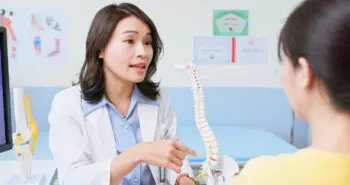Dr. Oren Gottfried is a fellowship-trained spinal neurosurgeon at Duke University who also serves as a TV medical advisor, actor, and writer for medical TV shows such as The Good Doctor. The National Spine Health Foundation spoke with him about his unique expertise in the Q&A below.
CAN YOU GIVE US SOME BACKGROUND ON YOUR CAREER AND HOW IT INVOLVES BEING BOTH A SPINE SURGEON AND A TV MEDICAL ADVISOR, WRITER, AND ACTOR?
It started way back in 2010 when I was just getting my spine practice going. I received a cold call from a Hollywood producer and I was asked to help on a small project.
>>>>> Pregnancy, Motherhood & Back Pain
I thought, “Wow, education is such an important part of what I do with my patients, when teaching colleagues, and presenting at conferences. What happens if I can educate a bigger audience?” It transitioned from just being the advisor for spine and neurosurgery issues to all of medicine. It’s nice to have this platform, but also it is a lot of responsibility because I’m working with writers that want to tell an interesting story. I feel like I’ve made my impact and I owe it to TV to extend that impact.
AS A NEUROSURGEON, WHAT IS MOST CHALLENGING ABOUT THE DRAMATIZATION OF THE BRAIN AND SPINE ON TV AND WHAT DO YOU FIND TO BE HELPFUL ABOUT IT?
It is easier to portray the extremes, but challenging to depict the more common scenarios. So much of spine care is not about the surgery. You don’t go right off to surgery or proceed to steroids injections. It’s the fundamental things like taking medications and participating in physical therapy that are more realistic but less glamorous. TV is going to depict a really big problem that needs a really big surgery and many times it’s a successful surgery when, in truth, success is a spectrum rather than binary — good or bad. So much of real medicine falls in the gray zone. There’s just not enough time on television to show the gray zone. The truth is, many times it takes months if not years to recover from spine surgery, but on TV things happen very quickly. Understanding the reality of spine disease and witnessing the struggles of my patients creates a heightened desire to avoid alienating or making them feel uncomfortable by an incorrect TV portrayal.
>>>>> Return to the Gym: Reducing Back Injuries While Working Out
Now on the flip side, where spine on TV is helpful, is when we can talk about spine disease. We can talk about herniated discs and spine trauma, and just put the discussion out there. I’d rather focus on the patient’s struggle and the accuracy of the medicine/treatment, even though it may not be delivered by the person who would actually be delivering it. In reality, spine health is managed by a team. You have physiatrists, physical therapists, occupational therapists, anesthesiologists, etc. Even among spine specialists, you can have orthopedic trained spine surgeons, neurosurgery trained spine surgeons, or orthopedic and neurosurgery trained spine surgeons. There’s just so many experts, but a TV show can’t have 20 experts treating one patient. I think ER and primary care physicians do great jobs with spinal disease.
Trailer for The Good Doctor, a show Dr. Gottfried has consulted for:
WHEN IT COMES TO YOUR ROLE AS A TV MEDICAL ADVISOR AND WRITER, WHAT DO YOU HOPE TO ADD TO THE MEDICAL TV NARRATIVE?
I aim to portray things accurately. I educate my patients that some people have outcomes that are so good that I almost don’t want to tell anyone else about them because I don’t want other patients to think “why didn’t my surgery end up like that?” TV may also depict rare, awful situations with poor outcomes. I don’t want that to scare my patient away from surgery if they need it, but do expect an appropriate level of fear over surgery. When someone watches a show that I’ve helped with, I’ve thought about all of these issues. I don’t provide my notes in a vacuum of me as a doctor, but instead I really think about how a person with that illness would perceive the show. I’m just a member of a team when I help on TV. I’m just the person who understands the medicine, so I’m constantly a proponent of the truth, but I also know that there’s only so much truth you can show on a 42 minute show. I will go to bat for every medical illness. That’s my role and I will never back down from it.
WHAT SHOULD REAL SPINE PATIENTS KNOW ABOUT THE DEPICTIONS OF SPINE CARE ON MEDICAL TV?
In general if there’s a medical consultant to the writer, they’re going to be able to bring the accuracy up to speed much better than any google search. As a consultant, I don’t just pay attention to neurosurgery and spine. I talk to a lot of clinicians in the hospital and see what they’re doing. I keep up with what’s new and exciting in other fields, and that direct knowledge is superior to any google search.
>>>> Get Spine Health news delivered to your inbox!
Technology is another interesting topic. Something I’ve noticed with TV shows is once they’ve used a certain technology, they may not want to mention it again. So let’s say a robot is being used during one episode — robotics are found in many medical fields these days — yet the show may not want to mention a robot a second or third time in other episodes because they already used it. I think it is nice to showcase technology, but it needs to be put in an appropriate frame of reference. Sometimes the medical community doesn’t have all of the clinical data. TV shows may not depict the downside of the technology, but I want the viewer to be aware that unless there’s hard data from valid studies and clinical trials, we don’t actually know if the technology is offering a better outcome.
GIVE US YOUR ‘BEHIND-THE-SCENES’ TAKEAWAY MESSAGE.
I think we’re all active viewers of life. We don’t just sit back and get information fed to us, we have to go verify it! I would love to have everybody go and learn more about conditions they see on TV. I would argue that any patient suffering from a spine condition that sees something about the spine on a TV show…should go do a little research and see if it’s real or not. I think there are so many good resources online, including the information provided by the National Spine Health Foundation. I always encourage patients to find their information from reputable sites that have put in the time and energy to have patient-facing accurate information. I think websites like spinehealth.org are very helpful because the information is presented in a very objective, unbiased way.
*This article is from the Spine Health Journal. Get past issues here.




